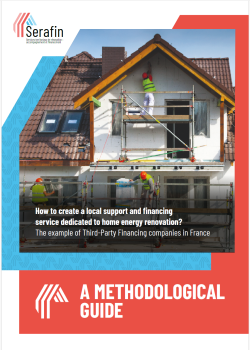Methodological guide: How to create a local support and financing service dedicated to home energy renovation?
The example of Third-Party Financing companies in France

The European Union wants to achieve a zero-emission building stock by 2050 and local one-stop shops for home energy renovation are key to achieving this target. According to the recently adopted Energy Efficiency Directive and the Energy Performance of Buildings Directive, Member States will need to roll out one one-stop shop for every 80,000 inhabitants or at least one per region to accompany homeowners, including those living in energy poverty and vulnerable households, on their renovation journey. Cities and regions will play a crucial role here – identifying vulnerable households, establishing local partnerships with the building sector, setting up one-stop shops…
In France, Third-Party Financing companies set up by five regions and metropolis are a real game-changer for homeowners aspiring to deep energy renovation.
The five French Third-Party Financing companies, a specific one-stop shop model for home energy renovation, provide technical and financial solutions to homeowners aspiring to deep energy renovation, regardless of their income. Four factors make their offer a real standout on the market: it is local, simple, accessible and secure (guaranteed quality of works and energy savings).
The experience of TPFC in France, which is unique in Europe and has demonstrated its effectiveness, should be made available to all local authorities wishing to set up a one-stop shop for home energy renovation.
This is precisely the purpose of the methodological guide, which describes the pathways and factors for success, as well as the limits and drawbacks of setting up an integrated home renovation service. The aim of this guide is to present the existing TPFC and their role (part 1), explain how they operate (part 2), and help public players, particularly local authorities, set up a TPFC in their area if the conditions are right (parts 3 and 4).
